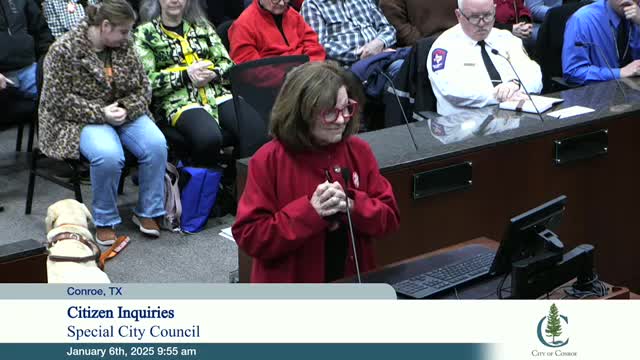Conroe council narrows public-comment scope, amends rules of procedure amid public objections
Get AI-powered insights, summaries, and transcripts
Subscribe
Summary
The council voted Jan. 6 to amend its rules of procedure to limit council members' responses to public comments to matters posted on the meeting agenda; the change drew immediate criticism from residents and at least one absent council member objected by written statement.
Conroe City Council on Jan. 6 approved an amendment to the council's rules of procedure that limits how members may respond to public comments and directs that responses be focused on items posted on the meeting agenda.
The change, presented to the council as an update to align meeting practice with Texas open-meetings guidance, prompted sustained disagreement during the special meeting. Several residents and council members urged caution, saying the amendment could diminish transparency and citizens' ability to raise off-agenda concerns.
City attorney Mike Garner briefed the council on legal constraints and said the law allows governing bodies to adopt reasonable, viewpoint-neutral rules that limit comment to agenda items. "A governmental body may adopt reasonable rules to maintain order of the meeting," he said during the briefing, describing the statute and attorney-general guidance the city considered.
Supporters, including the council member who introduced changes, said the revision would give the council a clearer process for handling citizen concerns and improve follow-up by routing off-agenda issues through department heads and a proposed citizen-issue management plan. Supporters described a pathway for citizens to ask for topics to be placed on future agendas and said the approach would enable responses without violating Texas's open meetings law.
Opponents argued the change would restrict public access and public oversight. In a written statement read aloud during the meeting, Councilman Howard Wood said limiting citizens' access to public comment is "in direct opposition to my core values" and asked that the item be deferred until all council members could participate. Other speakers in the meeting compared the measure to a curtailing of citizens' voice and said the proposed rule language had been posted on New Year's Eve without prior council discussion.
The council voted to adopt the amended rules. The motion passed in the open meeting after discussion and multiple public speakers. One council member stated publicly that, if the rule were enforced in a way that prevented citizens from speaking, she would not enforce it in her role as presiding officer and invited colleagues to "vote your conscience." The amendment also contains a provision discussed in the meeting that would allow a monetary fine for council members (not citizens) for noncompliance; the proposed fine and enforcement mechanics drew comment during debate.
What happens next: Council members said staff will develop a formal process to route citizen inquiries to the correct department, escalate unresolved matters to legal staff when appropriate, and put items on future agendas by request. Several council members asked for clear service-level agreements and timelines so residents can see when and how their issues will be addressed.
Sources: City attorney briefing and council discussion during the Jan. 6 special meeting; written statement from Councilman Howard Wood read into the record; public comments during citizens' inquiry.
